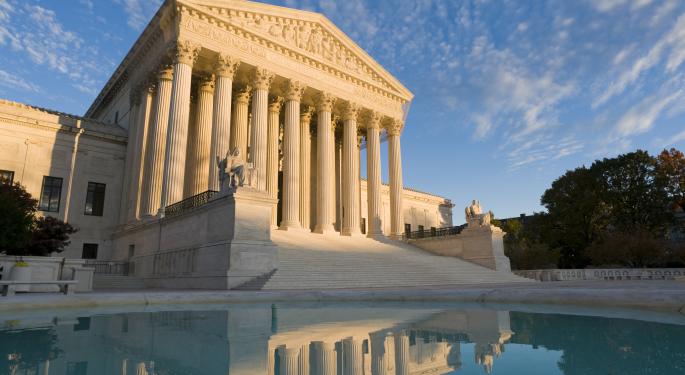How the Supreme Court Caused Anger With 'Pay to Delay' (ACT)
Usually, a case has a winner and a loser—or at least somebody wins enough to be happy and the other loses enough to be upset.
In this case, the winner was the U.S. government, but it didn’t win by much. The loser is Actavis (NYSE: ACT) and the rest of the pharma industry but it didn’t lose by much. Here’s why.
It started with testosterone. For men who are low on the hormone, Androgel was the answer. It came to market in 2000, and within seven years had sales topping $400 million.
In 2007, the drug was poised to lose about 75 percent of its profits as generic manufacturers moved in but after the normal patent-wrangling to try to fend off the generics, Solvay (the maker of Androgel) ended up “settling” the dispute and paying nearly $42 million a year to Actavis and two other generic manufacturers.
This settlement was what the FTC didn’t like. By paying off the generic companies, this “pay to delay” agreement was keeping a generic equivalent out of the hands of consumers forcing them to pay far more than they would if the generic equivalent were marketed. In fact, the FTC estimates that pay to delay deals cost the consumer $3.5 billion each year.
The FTC has argued for years that the agreements are something akin to market fixing, but lower courts didn’t agree. The Androgel case made it to the Supreme Court where the FTC wanted it to rule that all of these arrangements are illegal. Actavis wanted these agreements shielded from antitrust considerations.
The Supreme Court instead ruled that pay to delay agreements might be illegal and should be considered individually based on antitrust law.
Why is everybody mad? The FTC is mad because it will have to battle the cases individually—causing the agency valuable time and resources. The pharma industry believes that the ruling provides no guidance on how to avoid litigation when fashioning these deals. The Pharmaceutical Research and Manufacturers of America, an industry trade group said,
“…we are disappointed that the majority failed to provide clear and unambiguous guidance as to how patent settlements could be structured to avoid antitrust exposure short of litigating a patent dispute to the end.”
The group most pleased with the decision are the patent attorneys. Analyst Ronny Gal said, "If I were a patent attorney in the drug world, I would be opening a bottle of Champagne right now.”
Disclosure: At the time of this writing, Tim Parker had no position in any of the mentioned equities.
Latest Ratings for ACT
| Date | Firm | Action | From | To |
|---|---|---|---|---|
| Oct 2021 | Citigroup | Initiates Coverage On | Buy | |
| Oct 2021 | JP Morgan | Initiates Coverage On | Overweight | |
| Oct 2021 | Credit Suisse | Initiates Coverage On | Neutral |
© 2025 Benzinga.com. Benzinga does not provide investment advice. All rights reserved.
Posted-In: Analyst Color News Politics FDA Legal Analyst Ratings Media General Best of Benzinga



